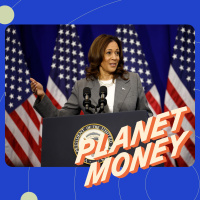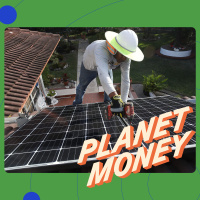Sinopsis
The economy, explained, with stories and surprises. Imagine you could call up a friend and say, "Meet me at the bar and tell me what's going on with the economy." Now imagine that's actually a fun evening. That's what we're going for at Planet Money. People seem to like it.
Episodios
-
Summer School 4: Banker vs president and the birth of the dollar
31/07/2024 Duración: 36minEpisodes each Wednesday through labor day. Find all the episodes from this season here. And past seasons here. And follow along on TikTok here for video Summer School. Planet Money Summer School has arrived at the birth of the United States and the chance to set up a whole new economy from scratch. Should there be a centralized bank? Should there be a single currency? We'll travel to two moments in the country's early history when the founders said "nope" to these questions and see what happened. First we'll witness one of the great economic battles in U.S. history – the president of the United States versus the president of the Bank of the United States – and see how the outcome ushered in an age of financial panics. Then we'll drop in on a time before the U.S. dollar existed as we know it, when you could buy things using one of about 8,000 forms of money circulating in the country. We watch as the Civil War leads to the first standard currency. Along the way, we'll learn why the cycle of economic booms and
-
Summer School 3: The first stock and perpetual life
26/07/2024 Duración: 34minEpisodes each Wednesday through labor day. Find all the episodes from this season here. And past seasons here. And follow along on TikTok here for video Summer School. Once upon a time, every business was a small business. It was run by the owner, maybe the spouse and the kids. Maybe they borrowed money from friends and relatives, but there was only so big it could get. Then came what can only be described as the big bang of economics. Over the span of a few decades, people figured out a way for businesses to sell ownership shares – otherwise known as stocks – and let people trade those shares. There was suddenly money to buy machines and expand. Today, we head to the Netherlands around the year 1600. First, we'll visit the bridge in Amsterdam where some of the first stock trading took place. Then we track down the Dutch water company that's the source of the oldest "living" bond. It's the origin of stocks and bonds and the stock market and it leads directly to many of the financial innovations that we still
-
What Kamala Harris' economic agenda might look like
24/07/2024 Duración: 18minLast weekend we were all thrown for a loop when President Joe Biden dropped out of the presidential race and endorsed Kamala Harris for the nomination. Just like everyone else, we are trying to quickly wrap our heads around what it means now that Harris is almost certainly going to be the Democratic nominee for president. We expect to see the Harris campaign come out with some official policy proposals in the coming weeks and months. But for now, all we've got are clues, little breadcrumbs that she has dropped throughout her career that might lead us to a rough idea of what economic policies she might support. Today on the show, we're going to visit three key moments from Harris' political career that might give us an idea of how her economic agenda might look. First, the 2019 presidential primary debates, where she laid out her own economic policies. Next, a vote in her Senate years that shows where she might fall on future trade agreements. And finally, a fight with some of the country's biggest banks from
-
The color monopoly
20/07/2024 Duración: 22minIn 2022, artist Stuart Semple opened up his laptop to find that all his designs had turned black overnight. All the colors, across files on Adobe products like Photoshop and Illustrator, were gone. Who had taken the colors away? The story of what happened begins with one company, Pantone.Pantone is known for their Color of the Year forecasts, but they actually make the bulk of their money from selling color reference guides. These guides are the standard for how designers pretty much anywhere talk about color.On today's show, how did Pantone come to control the language of the rainbow? We look back at the history of Pantone, beginning with the man who made Pantone into the industry standard. And, we hear from Stuart, who tried to break the color monopoly. Share your thoughts — What color should we choose to be Planet Money's color? This episode was hosted by Sam Yellowhorse Kesler and Jeff Guo, and produced by Willa Rubin with help from James Sneed. It was edited by Jess Jiang and fact-checked by Sierra Juare
-
Summer School 2: The golden ages of labor and looms
17/07/2024 Duración: 32minWho has the power? Workers or bosses? It changes through the ages, though it's usually the bosses. Today, we look at two key moments when the power of labor shifted, for better and worse, and we ask why then? What does history have to say about labor power right now? We travel to Sicily, Italy in the year 1347, where the bubonic plague is about to strike. The horror known as the Black Death will remake European society in countless ways, but we'll focus on one silver lining: how economic conditions shifted for workers. Then we head about 500 years into the future, to an English factory at the dawn of the Industrial Revolution, where textile workers take up arms against the machines taking their jobs and show how rapidly labor supply and demand can change. This is the famed tale of the Luddites, now a byword for knee jerk anti-technology, but the true story has nuance and a desperate but rational violent rebellion. This series is hosted by Robert Smith and produced by Audrey Dilling. Our project manager is Dev
-
Rooftop solar's dark side
12/07/2024 Duración: 27min4.5 million households in the U.S. have solar panels on their homes. Most of those customers are happy with it - their electricity bills have just about disappeared, and it's great for the planet. But thousands and thousands of people are really disappointed with what they've been sold. Their panels are more expensive than they should be, and they say it is hard to get someone to come fix them when they break. It turns out this sometimes crummy customer experience is no accident. It ties back to how big, national solar companies built their businesses in the first place. To entice people to install expensive solar panels, companies developed new financing models which cut upfront costs for customers. And they deployed lots and lots of salespeople to grow their businesses. But in the drive to get more households installing solar panels, consumer costs went up and the focus seemed to shift away from making sure those panels actually worked. All of this left some consumers feeling like they've been sold a lie.On
-
Summer School 1: An Economic History of the World
10/07/2024 Duración: 34minPlanet Money Summer School is back for eight weeks. Join as we travel back in time to find the origins of our economic way of life. Today we ask surprisingly hard question: What is money? And where did it come from? We travel to a remote island in the Pacific Ocean for the answer. Then we'll visit France in the year 1714, where a man on the lam tries to revolutionize the country's entire monetary system, and comes impressively close to the modern economy we have today, before it all falls apart. Check out our Summer School video cheat sheet on the origins of money at the Planet Money TikTok.The series is hosted by Robert Smith and produced by Audrey Dilling. Our project manager is Devin Mellor. This episode was edited by Planet Money Executive Producer Alex Goldmark and fact-checked by Sofia Shchukina. Help support Planet Money and hear our bonus episodes by subscribing to Planet Money+ in Apple Podcasts or at plus.npr.org/planetmoney.Learn more about sponsor message choices: podcastchoices.com/adchoicesNPR
-
How flying got so bad (or did it?)
05/07/2024 Duración: 25minWe often hear that air travel is worse than it's ever been. Gone are the days when airplanes touted piano bars and meat carving stations — or even free meals. Instead we're crammed into tiny seats and fighting for overhead space. How did we get here? Most of the inconveniences we think about when we fly can be traced back to the period of time just after the federal government deregulated the airlines. When commercial air travel took off in the 1940s, the government regulated how many national airlines were allowed to exist, where they were allowed to fly, and how much they could charge for tickets. But the Airline Deregulation Act of 1978 swept all these restrictions aside – and stopped providing subsidies for the air carriers. Airlines had to compete on ticket prices. That competition led to a more bare-bones flying experience, but it also made air travel a lot more affordable. In this episode, we trace the evolution of air travel over the past century to discover whether flying really is worse today — or i
-
The two companies driving the modern economy
03/07/2024 Duración: 20minAt the core of most of the electronics we use today are some very tiny, very powerful chips. Semiconductor chips. And they are mighty: they help power our phones, laptops, and cars. They enable advances in healthcare, military systems, transportation, and clean energy. And they're also critical for artificial intelligence, providing the hardware needed to train complex machine learning.On today's episode, we're bringing you two stories from our daily show The Indicator, diving into the two most important semiconductor chip companies, which have transformed the industry over the past 40 years. First, we trace NVIDIA's journey from making niche graphics cards for gaming to making the most advanced chips in the world — and briefly becoming the world's biggest company. Next, we see how the Taiwan Semiconductor Manufacturing Company's decision to manufacture chips for its competition instead of itself flipped the entire industry on its head, and moved the vast majority of the world's advanced chip production to Ta
-
Do immigrants really take jobs and lower wages?
29/06/2024 Duración: 25minWe wade into the heated debate over immigrants' impact on the labor market. When the number of workers in a city increases, does that take away jobs from the people who already live and work there? Does a surge of immigration hurt their wages? The debate within the field of economics often centers on Nobel-prize winner David Card's ground-breaking paper, "The Impact of the Mariel Boatlift on the Miami Labor Market." Today on the show: the fight over that paper, and what it tells us about the debate over immigration. More Listening: - When The Boats Arrive - The Men on the RoofThis episode was hosted by Amanda Aronczyk and Jeff Guo. It was produced by Willa Rubin, edited by Annie Brown, and engineered by Valentina Rodríguez Sánchez. Fact-checking by Sierra Juarez. Alex Goldmark is Planet Money's executive producer.Help support Planet Money and hear our bonus episodes by subscribing to Planet Money+ in Apple Podcasts or at plus.npr.org/planetmoney.Learn more about sponsor message choices: podcastchoices.com/adc
-
The Carriage Tax (Update)
26/06/2024 Duración: 18min(Note: A version of this episode originally ran in 2019.)In 1794, George Washington decided to raise money for the federal government by taxing the rich. He did it by putting a tax on horse-drawn carriages.The carriage tax could be considered the first federal wealth tax of the United States. It led to a huge fight over the power to tax in the U.S. Constitution, a fight that continues today.Listen back to our 2019 episode: "Could A Wealth Tax Work?"Listen to The Indicator's 2023 episode: "Could SCOTUS outlaw wealth taxes?" This episode was hosted by Greg Rosalsky and Bryant Urstadt. It was originally produced by Nick Fountain and Liza Yeager, with help from Sarah Gonzalez. Today's update was produced by Willa Rubin and edited by Molly Messick and our executive producer, Alex Goldmark.Help support Planet Money and hear our bonus episodes by subscribing to Planet Money+ in Apple Podcasts or at plus.npr.org/planetmoney.Learn more about sponsor message choices: podcastchoices.com/adchoicesNPR Privacy Policy
-
How Juul created a market, fueled a crisis, and why regulators failed to stop it
21/06/2024 Duración: 27minWhen the vape brand Juul first hit the market back in 2015, e-cigarettes were in a kind of regulatory limbo. At the time, the rules that governed tobacco cigarettes did not explicitly apply to e-cigarettes. Then Juul blew up, fueled a public health crisis over teen vaping, and inspired a regulatory crackdown. But when the government finally stepped in to solve the problem of youth vaping, it may have actually made things worse.Today's episode is a collaboration with the new podcast series "Backfired: the Vaping Wars." You can listen to the full series at audible.com/Backfired.This episode was hosted by Alexi Horowitz-Ghazi and Leon Neyfakh. It was produced by Emma Peaslee and edited by Jess Jiang with help from Annie Brown. It was fact checked by Sofia Shchukina and engineered by Cena Loffredo. Alex Goldmark is Planet Money's executive producer.Help support Planet Money and hear our bonus episodes by subscribing to Planet Money+ in Apple Podcasts or at plus.npr.org/planetmoney.Learn more about sponsor message
-
Why is everyone talking about Musk's money?
19/06/2024 Duración: 28minWe've lived amongst Elon Musk headlines for so long now that it's easy to forget just how much he sounds like a sci-fi character. He runs a space company and wants to colonize mars. He also runs a company that just implanted a computer chip into a human brain. And he believes there's a pretty high probability everything is a simulation and we are living inside of it.But the latest Elon Musk headline-grabbing drama is less something out of sci-fi, and more something pulled from HBO's "Succession."Elon Musk helped take Tesla from the brink of bankruptcy to one of the biggest companies in the world. And his compensation for that was an unprecedentedly large pay package that turned him into the richest person on Earth. But a judge made a decision about that pay package that set off a chain of events resulting in quite possibly the most expensive, highest stakes vote in publicly traded company history.The ensuing battle over Musk's compensation is not just another wild Elon tale. It's a lesson in how to motivate t
-
What's with all the tiny soda cans? And other grocery store mysteries, solved.
14/06/2024 Duración: 24minThere's a behind the scenes industry that helps big brands decide questions like: How big should a bag of chips be? What's the right size for a bottle of shampoo? And yes, also: When should a company do a little shrinkflation? From Cookie Monster to President Biden, everybody is complaining about shrinkflation these days. But when we asked the packaging and pricing experts, they told us that shrinkflation is just one move in a much larger, much weirder 4-D chess game. The name of that game is "price pack architecture." This is the idea that you shouldn't just sell your product in one or two sizes. You should sell your product in a whole range of different sizes, at a whole range of different price points. Over the past 15 years, price pack architecture has completely changed how products are marketed and sold in the United States. Today, we are going on a shopping cart ride-along with one of those price pack architects. She's going to pull back the curtain and show us why some products are getting larger whil
-
Bringing a tariff to a graphite fight
12/06/2024 Duración: 25minGraphite is sort of the one-hit wonder of minerals. And that hit? Pencils. Everyone loves to talk about pencils when it comes to graphite. If graphite were to perform a concert, they'd close out the show with "pencils," and everyone would clap and cheer. But true fans of graphite would be shouting out "batteries!" Because graphite is a key ingredient in another important thing that we all use in our everyday lives: lithium ion batteries.Almost all of the battery-ready graphite in the world comes from one place: China. That's actually true of lots of the materials that go into batteries, like processed lithium and processed cobalt. Which is why it was such a big deal when, earlier this year, President Biden announced a tariff package that will make a bunch of Chinese imports more expensive. Included in this package are some tariffs on Chinese graphite. He wants to create a new battery future—one that doesn't rely so much on China. In this episode, we get down on the ground to look at this big supply chain stor
-
How much national debt is too much?
07/06/2024 Duración: 26minMost economic textbooks will tell you that there can be real dangers in running up a big national debt. A major concern is how the debt you add now could slow down economic growth in the future. Economists have not been able to nail down how much debt a country can safely take on. But they have tried.Back in 2010, two economists took a look at 20 countries over the course of decades, and sometimes centuries, and came back with a number. Their analysis suggested that economic growth slowed significantly once national debt passed 90% of annual GDP... and that is when the fight over debt and growth really took off.On today's episode: a deep dive on what we know, and what we don't know, about when exactly national debt becomes a problem. We will also try to figure out how worried we should be about the United States' current debt total of 26 trillion dollars.This episode was hosted by Keith Romer and Nick Fountain. It was produced by Willa Rubin and edited by Molly Messick. It was fact-checked by Sierra Juarez wi
-
The history of light (classic)
05/06/2024 Duración: 21minFor thousands of years, getting light was a huge hassle. You had to make candles from scratch. This is not as romantic as it sounds. You had to get a cow, raise the cow, feed the cow, kill the cow, get the fat out of the cow, cook the fat, dip wicks into the fat. All that--for not very much light. Now, if we want to light a whole room, we just flip a switch.The history of light explains why the world today is the way it is. It explains why we aren't all subsistence farmers, and why we can afford to have artists and massage therapists and plumbers. (And, yes, people who make podcasts about the history of light.) The history of light is the history of economic growth--of things getting faster, cheaper, and more efficient.On today's show: How we got from dim little candles made out of cow fat, to as much light as we want at the flick of a switch.Today's show was hosted by Jacob Goldstein and David Kestenbaum. It was originally produced by Caitlin Kenney and Damiano Marchetti. Today's rerun was produced by James
-
How the FBI's fake cell phone company put criminals into real jail cells
31/05/2024 Duración: 23minThere is a constant arms race between law enforcement and criminals, especially when it comes to technology. For years, law enforcement has been frustrated with encrypted messaging apps, like Signal and Telegram. And law enforcement has been even more frustrated by encrypted phones, specifically designed to thwart authorities from snooping. But in 2018, in a story that seems like it's straight out of a spy novel, the FBI was approached with an offer: Would they like to get into the encrypted cell phone business? What if they could convince criminals to use their phones to plan and document their crimes — all while the FBI was secretly watching? It could be an unprecedented peek into the criminal underground. To pull off this massive sting operation, the FBI needed to design a cell phone that criminals wanted to use and adopt. Their mission: to make a tech platform for the criminal underworld. And in many ways, the FBI's journey was filled with all the hallmarks of many Silicon Valley start-ups. On this show,
-
So you've been scammed, now what?
29/05/2024 Duración: 27minWe are living in a kind of golden age for online fraudsters. As the number of apps and services for storing and sending money has exploded – so too have the schemes that bad actors have cooked up to steal that money. Every year, we hear more and more stories of financial heartbreak. What you don't often hear about is what happens after the scam?On today's show, we follow one woman who was scammed out of over $800,000 on her quest to get her money back. That journey takes her from the halls of the FBI to the fraud departments of some of the country's biggest financial institutions. And it offers a window into how the systems that are theoretically designed to help the victims of financial cybercrime actually work in practice. This episode was hosted by Alexi Horowitz-Ghazi and Jeff Guo. It was produced by Willa Rubin and edited by Keith Romer. It was engineered by Neal Rauch and fact-checked by Sierra Juarez. Alex Goldmark is Planet Money's executive producer.Help support Planet Money and hear our bonus episod
-
The junkyard economist
24/05/2024 Duración: 25minOn today's episode, we ride through the streets of San Francisco with a long-time junkman, Jon Rolston. Jon has spent the last two decades clearing out houses and offices of their junk. He's found all sorts of items: a life-time supply of toilet paper, gold rings, $20,000 in cash. Over the years, he's developed a keen eye for what has value and what might sell. He's become a kind of trash savant.As we ride with Jon, he shows us the whole ecosystem of how our reusable trash gets dealt with — from metals (ferrous and non-ferrous) to tires to cardboard. And we see how our junk can sometimes get a second chance at life. If you can understand the junk market like Jon, you can understand dozens of trends in our economy. This episode was hosted by Erika Beras and James Sneed, and produced by James Sneed with help from Emma Peaslee. It was edited by Jess Jiang. Engineering by Josh Newell. It was fact-checked by Sierra Juarez. Alex Goldmark is Planet Money's executive producer.Help support Planet Money and hear our b






























